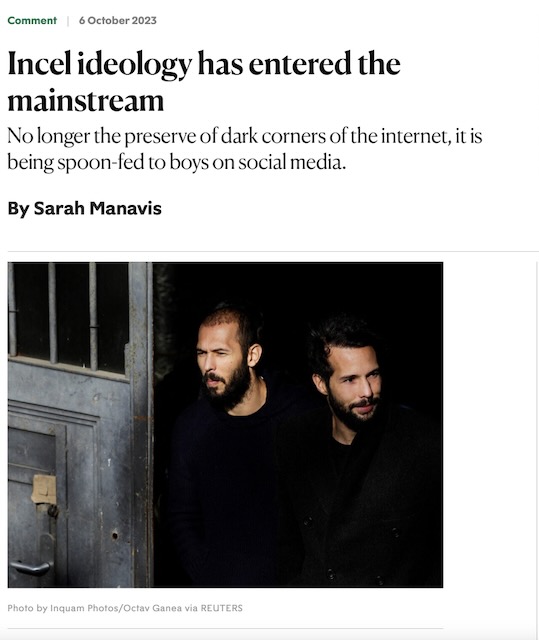The latest catch-all term used to smear opinions that feminists disagree with is ‘incel culture’ or ‘incel ideology’- this can mean pretty much anything and can apply to opinions that have no connections to incels. Even incels don’t conform to the supposed ideology of ‘incel culture’. This is all part of building the rhetorical fortress that makes it harder to challenge feminist ideology.

The latest piece of tat masquerading as journalism, pushing this term, was written Sarah Manavis in the New Statesman here. Sarah comes from an all too predictable background. She read English Literature graduate at Edinburgh University. I have written elsewhere about the lack of cognitive diversity among media commentators on sex and gender (see Lit Crit Femsplainers). Her background matters because English departments were among the first to circle and go down the drain of critical social justice (see death of the English Literature degree). Sarah Manavis talks a lot about deradicalising boys, but she might like to reflect on her own radicalisation pathway.
A common feature of these articles is that the authors, without presenting any evidence, claim to have infiltrated incel forums. This was the tactic employed by Laura Bates (another misandrist Eng lit graduate) and the only evidence was she provided was a well-known quote from a forum that was taken down 10 years before her supposed period of research. This is an unfortunate state of affairs, because there are people doing serious and scholarly research that involves surveying large numbers of self-identified incels which presents a picture very different to the one promoted by Sarah Manavis. A good place to start is the work of William Costello. His research suggested that they are not violent or even particularly misogynist. Indeed, their anger is more often directed at sexually successful men (chads) or themselves, than against women. Another study looking at 270 self reported incels found that they were a diverse group. Some were externalisers who blamed wider society for their problems but the majority were internalisers who blamed themselves and were at risk of self harm rather than harming other people.
The article by Manavis relies on a few questionable cases to support the notion that incels are violent. The real story of Jake Davison ,who shot five people in Plymouth in 2021, was mentally ill and yet somehow managed to obtain fire arm by legitimate means. He had at one point looked at an incel website but rejected their philosophy. The link between his violent actions and viewing incel material online is highly questionable, but this hasn’t stopped feminists weaponising the case.
The article then links characters such as Andrew Tate, who are clearly not incels, with ‘incel ideology.’ In doing so Sarah Manavis renders the term meaningless. Andrew Tate is a braggart, a pick up artist, and probably a criminal, but he is not an incel. Those who have studied incel forums in a meaningful way, report that incels dislike him and view him as their number one enemy; a sexually successful man. Using a blanket term such as ‘incel ideology’ adds nothing useful.
The New Statesman article rightly decries misogynist material on the internet, but Sarah Manvis should also acknowledge the torrent of misandry coming form parts of the mainstream media and educational establishment and the role that is playing in alienating boys who are not just drawn to figures such as Tate , but pushed in his direction by the negative stereotyping they experience.
Sarah Manavis laments the fact that most 6-15 year olds had heard of Andrew Tate. While this may be true, feminists have done more than anyone to keep Andrew Tate in the foreground and enhance his visibility and they do that because he is useful to them. He can be used to demonise men and boys and as a smear against mens rights activism in general. She also fails to explore other reasons why some boys may be drawn to Andrew Tate, in particular, the feminisation of the curriculum. Boys are not buying into the kind of feminist BS they are being fed in at least some schools (see Welsh War on Boys and Welsh War on Boys 2) and they look elsewhere and inevitably light on Andrew Tate. Also, many boys are much more sophisticated than Sarah Manavis gives them credit for; they are not just moths drawn towards the light, as she portrays them. When dealing with a po-faced and censorious culture that views masculinity itself as a problem they know they can chuck a metaphorical brick in the pond by raising the spectre of of Andrew Tate.
We deserve better journalism than this tawdry offering served up in the New Statesman.
The hypocrisy of this is astonishing; it is intended to shut down debate with the use of a sexist insult.
As we’ve seen many times, a man using the same method will be leapt on by Fenminists and their media allies as an example of “Mysoogyny” and will be cancelled, and yet, in this alleged patriarchy, women can do this with no consequences.
It’s yet another example of how feminism relies on the very thing it denies exists; the desire of men to protect and stand up for women, even to the extent of protecting women from consequences for their own actions.
LikeLike